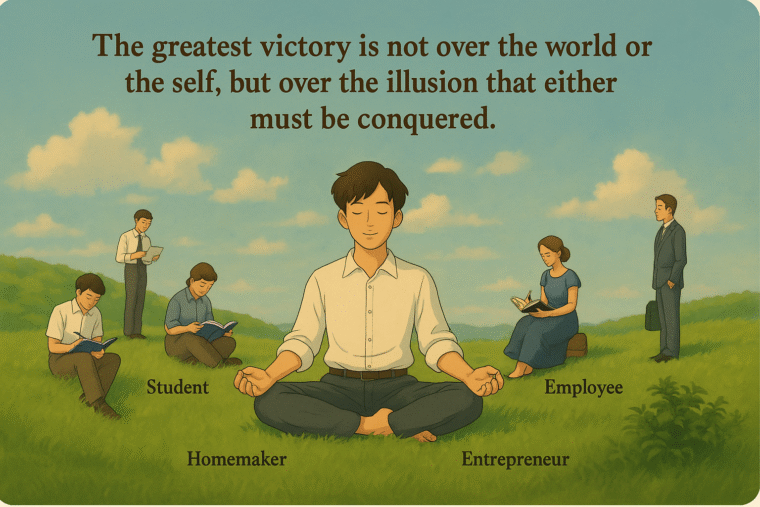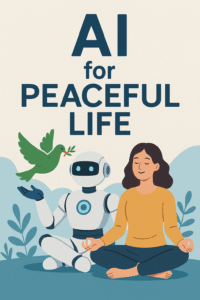By Dr. Thyagaraju G S
In life, we are often told to conquer the world, to master ourselves, and to always aim for victory. But what if the greatest victory is not in the act of conquering at all? What if true success lies in the realization that nothing needs to be conquered in the first place?
Let’s explore this concept together and understand how we can apply it to our own lives — as students, professionals, homemakers, entrepreneurs, or simply as human beings. By learning to let go of the need to control or fight, we can experience a deeper sense of peace and fulfillment.
🧭 What Are We Trying to Conquer?
Before we explore the idea of not needing to conquer anything, let’s first examine the common areas we feel compelled to “win” over.
1. The World Around Us
Many people believe that success means dominating the world — having control over people, situations, or outcomes. We often chase after fame, wealth, or recognition, thinking that these things will make us feel powerful and complete.
But the world is constantly shifting. People change, economies fluctuate, circumstances evolve, and life’s uncertainties always remain. Trying to control the world is like trying to hold onto water in your hands. No matter how tightly you grip, it will slip away.
2. Ourselves
On the other hand, many people turn inward and seek to conquer their own minds, thoughts, and emotions. We try to master ourselves, fix our weaknesses, and eliminate flaws. Whether it’s through meditation, discipline, or therapy, we often think that we must “perfect” ourselves to be worthy of happiness or success.
However, the truth is, we are inherently imperfect. Human beings are complex, filled with both strengths and weaknesses. Trying to control every aspect of ourselves creates inner tension and frustration. Instead of focusing on perfecting ourselves, we could be learning to embrace our true nature, imperfections and all.
🌈 The Real Secret to True Victory
The true victory does not come from conquering the world or our minds. In fact, the greatest victory comes when we realize that we don’t need to conquer anything at all.
Victory is not about control. It’s about understanding, acceptance, and peace. It’s about recognizing that the need for control arises from a place of fear and insecurity, and that letting go of this need leads to a more peaceful, fulfilled existence.
🌱 7 Steps to Achieve True Inner Peace (With Real-Life Examples)
Here’s a deeper look at 7 simple, but powerful steps that anyone — whether you’re a student, researcher, entrepreneur, or homemaker — can take to achieve inner peace and freedom from the need for control.
1. Pause and Breathe
One of the simplest yet most powerful ways to calm the mind and reset our focus is by taking deep breaths. Breathing consciously helps us reconnect with the present moment and let go of stress.
Example:
- Student: Before taking an exam, many students feel nervous. Rather than letting that anxiety control you, try pausing for a moment and taking three slow, deep breaths. This simple act helps you center your thoughts and focus on the task ahead.
- Entrepreneur: Before a big presentation or meeting, take a few deep breaths. Let go of the tension in your body. You’ll be surprised at how much more clearly you can think when you’re not overwhelmed by stress.
2. Observe, Don’t Judge
Our mind constantly labels things as “good” or “bad.” This habit of judgment creates unnecessary stress and keeps us from seeing things clearly. Instead of judging your thoughts, feelings, or actions, just observe them without attaching labels.
Example:
- Employee: You receive a difficult task at work. Instead of immediately thinking, “This is too hard for me,” take a moment to observe your feelings. What’s going on inside? You might feel anxious, but observe that anxiety with compassion, not judgment. It’s just a feeling, not a truth about your ability.
- Homemaker: You’ve just cleaned the house, but the children have made a mess again. Instead of becoming frustrated, observe the situation without judgment. This isn’t a personal failure. Messes are part of life. By letting go of judgment, you can approach the situation with patience and understanding.
3. Let Go of Control
We cannot control everything — not people, not outcomes, not even our emotions all the time. When we try to control everything, we fight against the flow of life. Instead, try accepting what is, and focus on what you can control — your attitude and actions.
Example:
- Businessman: The stock market fluctuates, and a business’s success can feel unpredictable. Instead of trying to control every variable, focus on providing value, maintaining your integrity, and adapting to change.
- PhD Researcher: Sometimes, experiments fail despite our best efforts. Instead of trying to force results, let go of the need for immediate success. Failures are a natural part of the research process and lead to better learning.
4. Be Kind — To Yourself and Others
Kindness is a form of strength. When we make mistakes, we often treat ourselves harshly, but this creates unnecessary suffering. Instead, show yourself compassion. When you make mistakes, remember that they are simply part of the learning process.
Example:
- Student: You didn’t do as well as you hoped on your last exam. Instead of being hard on yourself, practice self-compassion. Understand that one exam doesn’t define your worth. Treat yourself with kindness, learn from it, and try again.
- Mother: As a homemaker, things don’t always go as planned. The kitchen might get messy, or you might feel overwhelmed by responsibilities. Treat yourself kindly. You are doing your best, and that’s enough.
5. Accept Imperfection
The desire for perfection is one of the most common reasons people feel stress and dissatisfaction. Perfectionism makes us constantly feel like we’re “not enough.” Instead of striving for perfection, aim for growth and understanding. We don’t need to be perfect to be happy.
Example:
- Entrepreneur: Your business might not be perfect, and your products might need improvement. Accept that imperfection is part of the journey. Every failure teaches you something valuable.
- Employee: You don’t have to be the perfect worker. It’s okay to make mistakes, learn, and improve. Your value is not in being flawless but in being present, engaged, and willing to grow.
6. Stay Curious, Not Competitive
Often, we feel like we need to outdo others to succeed. But true success doesn’t come from competition. It comes from curiosity and learning. By focusing on curiosity rather than comparison, we open ourselves to growth and new possibilities.
Example:
- Researcher: Instead of comparing yourself to others in your field, focus on what excites you about your work. Ask new questions and look for answers that bring you joy and satisfaction.
- Businessman: Instead of worrying about competitors, focus on improving your products or services. Ask yourself: How can I make my work more meaningful? How can I add more value to people’s lives?
7. Rest in Awareness
One of the most powerful things we can do is simply be still and be aware. When we rest in awareness, we allow our minds to quiet and become more attuned to the present moment. This is where true peace resides.
Example:
- Everyone: Take time each day to sit in stillness for a few minutes. Close your eyes, breathe, and simply observe. You don’t need to do anything, achieve anything, or think about anything. Just be.
- Entrepreneur: At the end of each day, take a moment to disconnect from your work. Resting in awareness helps you recharge and see things from a fresh perspective.
🌟 What Happens When You Let Go?
When you stop trying to conquer:
- The world opens up instead of shrinking.
- Your mind becomes calmer and more focused.
- You start enjoying the journey rather than obsessing over the destination.
🧘♂️ Final Words: Victory is Peace, Not Power
The greatest victory is not when the world obeys you, nor when you conquer your mind. It’s when you realize that you don’t need to fight against anything at all.
When we stop trying to control every aspect of life, we experience true freedom. We can live with peace, joy, and love, without needing to prove ourselves or win every battle.
That is the real victory.
Dr. Thyagaraju G S











